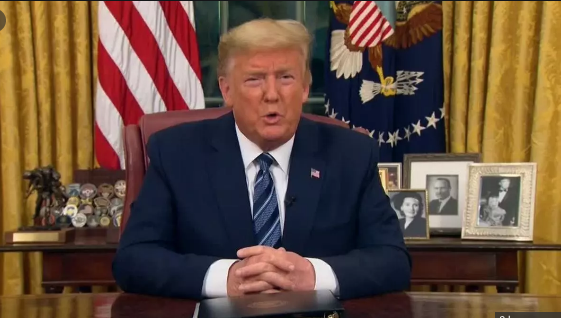Taking drastic action on Wednesday, President Donald Trump announced he is cutting off travel from 26 European nations to the U.S. and moving to ease the economic cost of a viral pandemic that is disturbing global financial markets and interrupting the daily lives of Americans.
Speaking from the Oval Office, Trump made the announcement that he is suspending all travel from Europe to the U.S. for 30 days, beginning late Friday, at midnight. Trump said:
“We made a lifesaving move with early action on China. Now we must take the same action with Europe.”
Trump said the restrictions wouldn’t apply to the United Kingdom, and there would be exemptions for “Americans who have undergone appropriate screenings.” He stated the U.S. would monitor the situation to determine if travel could resume earlier. He added:
“The virus will not have a chance against us. No nation is more prepared, or more resilient. We are all in this together. We must put politics aside, stop the partisanship and unified together as one nation, and one family.”
RELATED STORY:
The announcement came on a day when, after the WHO declared the global crisis a pandemic, communities canceled public events nationwide, universities moved to cancel in-person classes, and families wrestled with the school closings. The number of confirmed cases of the infection in the U.S. topped 1,000.
RELATED STORY:
Congress unveiled a multibillion-dollar aid package Wednesday that was expected to be voted on by the House as soon as Thursday. Dr. Anthony Fauci, director of the National Institute of Allergy and Infectious Disease, said in testimony before the House Oversight and Reform Committee:
“I can say we will see more cases, and things will get worse than they are right now. (The coronavirus is) Ten times more lethal than the seasonal flu.”
In anticipation of his remarks, White House aides tried to determine what action the president could take unilaterally and what required congressional action, as Trump personally weighed the public and political reactions to the prospects before him.
Trump said he was also directing agencies to provide undefined financial relief for “for workers who are ill, quarantined or caring for others due to coronavirus,” and asked Congress to take action to extend it.
Trump said the Small Business Administration would also make low-interest loans available to businesses to help them weather the storm. He said the U.S. would defer tax payments for some individual and business filers for three months to lessen the impacts of the virus outbreak. He added:
“This is not a financial crisis. This just a temporary moment of time that we will overcome together as a nation and as a world.”
RELATED STORY:
Trump also reiterated his call on Congress to pass a cut to the federal payroll tax in order to stimulate the economy. However, that proposal was dismissed by many lawmakers on both sides of the aisle. He remained silent on his previous calls to assist industries hard-hit by the pandemic like airlines and cruise ships.
An economic assistance plan was unveiled on Capitol Hill that was gaining bipartisan backing. Fundamental to the package is free coronavirus testing nationwide and emergency funding to reimburse lost paychecks for those self-quarantining, missing work, or losing jobs amid the outbreak. Treasury Secretary Steven Mnuchin, whom Trump tapped to negotiate with Nancy Pelosi, urged Congress “to pass legislation quickly.” Mnuchin said of the crisis:
“This is a little bit like a hurricane, and we need to cover these outside of normal expenses.”
For most people, the new coronavirus causes only mild or moderate symptoms, such as fever and cough. For some, especially older adults and people with existing health problems, it can cause more severe illness, including pneumonia.
RELATED STORY:
The vast majority of people recover from the new virus. According to the World Health Organization, people with mild illness recover in about two weeks, while those with more severe illness may take three to six weeks to recover.
Congress’ attending physician told staff there could be 70 million to 100 million coronavirus cases in the U.S. That’s on track with other estimates. A Harvard official has estimated that 20 percent to 60 percent of adults will get the virus, noting it’s “a pretty wide range.”












